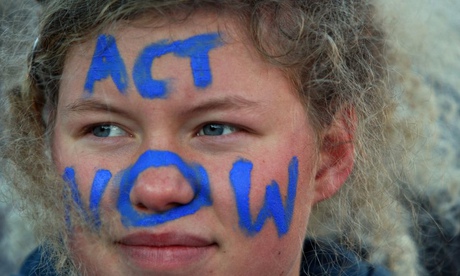
At the beginning of the 2000s, a handful of NGOs were calling for the world to wake up to global warming, but since then it has grown to become a mass movement.
The campaign issues can be complex and the voices many. To help you navigate, here's a list of the top ten books to help you understand the movement.
1. This Changes Everything: Capitalism v the Climate by Naomi Klein
The latest book from Naomi Klein, author and activist, is set to be released in September this year. Before engaging with environmental issues, Klein was part of the movement against neoliberal globalisation. Her new book picks up a central critique of many climate groups, explaining why capitalism is deeply related to the climate crisis. As a member of the board of 350.org, she shares not only comment but practical insights into the strategies and plans of the movement.
2. The End of Nature by Bill McKibben
A golden oldie, The End of Nature by US-scholar and long-term climate activist Bill McKibben, is said to be the first non-scientific book on global warming. It treats climate change as one part of a global ecological crisis, which can only be solved by a radical change of the perception, and treatment, of nature. The book is important because it demaded extensive change at an early stage (1989) and it directs this demand not only towards politicians, but to society as a whole.
3. Politics of Climate Justice by Patrick Bond
This 2012 release comes from the popular scholar-activist Patrick Bond, from South Africa. Using examples from countries in the global south he argues that market-based instruments such as carbon trading and the clean-development mechanism are not working. They often have negative consequences for the local population, harm the environment and make little impact on reducing emissions.
4. Climate Politics and the Climate Movement in Australia by Verity Burgmann and Hans Baer
Also from 2012, this book reports on a less well-known part of the movement. Australia is characterised by a vivid and broad debate around climate change that involves church groups, trade unions and political parties. The movement here tends to be moderate and has significant political weight – it played a central role in the decision to adopt a national carbon tax.
5. The God Species by Mark Lynas
British journalist and activist Mark Lynas explores how to overcome the environmental and climate crisis in this 2011 publication. Lynas advocates the use of controversial technologies such as nuclear energy and genetic engineering. The ideas proposed in the book prompted debate and soul-searching among the green movement in Britain.
6. Space for Movement? Reflections from Bolivia by Building Bridges Collective
In this 2010 book, activists report on the World People's Conference on Climate Change in Bolivia in April 2010. This alternative conference developed radical demands for civil society and southern states, such as a climate justice court and huge financial transfers. It illustrated the ability of the movement to engage political actors, and development new alliances after the failure of the Copenhagen conference in 2009. Bolivia brought parts of the conference declaration to the United Nations Framework Convention on Climate Change (UNFCC) process, but they had no enduring effects.
7. Toward Climate Justice by Brian Tokar
A good introduction into the central concept of the movement – justice. In Tokar's 2010 publication he explains why activists refuse the "false solutions" of climate change such as as economic instruments. He stresses the responsibility of the northern countries for emission cuts and resource transfers, and the need to support southern countries.
8. Criticism without Critic: A Climate Camp Reader by Shift Magazine/Dysophia
This small booklet from 2010 documents climate camps. The camps are popular forms of protest in the movement that relate direct action to sustainable living and education. The first camp was in 2006 near the coal-fired power station Drax in the UK and protested against its huge emissions. The reader reveals conflicts in the camps, shows how much organisational energy they require, and explains why they came to an end in the UK in 2010.
9. Contours of Climate Justice by Ulrich Brand and others
This publication was written by internationally known activists and scientists in 2009. It is a broad and critical analysis of climate policy and also explores alternative ways to solve the crisis, considering the application of perspectives such as feminism. The flexible mechanisms of the Kyoto protocol as well as the idea of green capitalism are criticised and alternatives such as climate justice and sustainable economies are presented.
10. Greenhouse Gangsters vs. Climate Justice by CorpWatch
This relatively unknown piece from 1999 had a huge impact on the climate movement. The report by the NGO CorpWatch is the origin of the term and concept "climate justice", starting a public debate. It is impressive how similar the original definition is to its current use and that the concept, which added a new dimension to the understanding of climate change, stemmed from a single NGO.
Matthias Dietz is a researcher at the Centre for Social Policy Research at the University of Bremen, Germany and edited the Routledge Handbook of the Climate Change Movement.
Read more stories for global development students:
• 15 ways to make your mark as a volunteer
• Interning at the UN: why I left my family for New York City
• New year's resolution 2: to get my first job in development
Join the community of global development professionals and experts. Become a GDPN member to get more stories like this direct to your inbox

